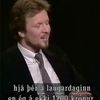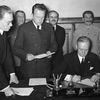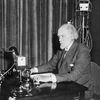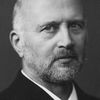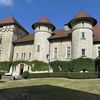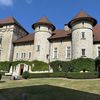20.1.2024 | 18:34
Liberty Made Inspiring Again
European Diary: Belgrade, May 2022
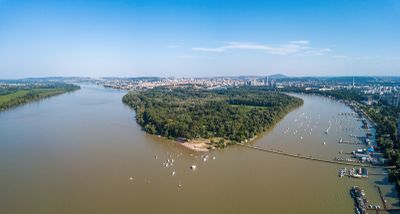 Belgrade, the capital of Serbia, is located at the confluence of the Sava and Danube Rivers as well at the crossroads of the Pannonian Plain and the Balkan Peninsula. It is therefore not surprising that it is a very old city, indeed one of the oldest continuously inhabited cities in Europe and in the world. Belgrade means White City, and it is named after its fortress, which was built on a white ridge of strategic importance. After the fall of the Roman Empire it was conquered and controlled and sometimes destroyed by various invaders, such as the Huns, Goths, Hungarians, and Byzantines. In the 13th century it became the capital of the so-called Serbian Despotate but in 1521 it fell to the Ottomans. After the Serbian wars for independence, Belgrade became in 1841 the capital again of Serbia, first the principality and then the kingdom. In 1918 the city became the capital of the Kingdom of the Serbs, Croats and Slovenes which was in 1929 changed into the Kingdom of Yugoslavia. This was an artificial country, jumbled together at the end of the First World War. It was basically a hostile takeover by Serbia of Slovenia, Croatia, Bosnia, Hercegovina, Northern Macedonia, and Montenegro. It was therefore not surprising that Yugoslavia broke up soon after the death of the communist leader Josip Broz Tito who had for decades ruled these diverse territories with an iron hand. But Belgrade itself has gained from diversity as I discovered when I was áthere in May 2022. It is a lively and pleasant city. Being a meeting place of many cultures, it is however hard to tell whether it belongs to the East or the West.
Belgrade, the capital of Serbia, is located at the confluence of the Sava and Danube Rivers as well at the crossroads of the Pannonian Plain and the Balkan Peninsula. It is therefore not surprising that it is a very old city, indeed one of the oldest continuously inhabited cities in Europe and in the world. Belgrade means White City, and it is named after its fortress, which was built on a white ridge of strategic importance. After the fall of the Roman Empire it was conquered and controlled and sometimes destroyed by various invaders, such as the Huns, Goths, Hungarians, and Byzantines. In the 13th century it became the capital of the so-called Serbian Despotate but in 1521 it fell to the Ottomans. After the Serbian wars for independence, Belgrade became in 1841 the capital again of Serbia, first the principality and then the kingdom. In 1918 the city became the capital of the Kingdom of the Serbs, Croats and Slovenes which was in 1929 changed into the Kingdom of Yugoslavia. This was an artificial country, jumbled together at the end of the First World War. It was basically a hostile takeover by Serbia of Slovenia, Croatia, Bosnia, Hercegovina, Northern Macedonia, and Montenegro. It was therefore not surprising that Yugoslavia broke up soon after the death of the communist leader Josip Broz Tito who had for decades ruled these diverse territories with an iron hand. But Belgrade itself has gained from diversity as I discovered when I was áthere in May 2022. It is a lively and pleasant city. Being a meeting place of many cultures, it is however hard to tell whether it belongs to the East or the West.
On the Bank of the Danube
In Belgrade I was presenting my book in two volumes on Twenty-Four Conservative-Liberal Thinkers at a seminar organised jointly by the Austrian Economics Center in Vienna and the Faculty of Economics and Business Administration at the University of Belgrade. The evening before the seminar I went for a stroll from my hotel down to the Danube. I stood for a while and watched this magnificent river which flows through four European capitals, Vienna, Bratislava, Budapest, and Belgrade. Originating in the Black Forest in southern Germany, it empties into the Black Sea through the Danube Delta between Romania and Ukraine. It is the second-largest river in Europe, after Volga in Russia. Indeed, the Habsburg Empire was sometimes called the Danubian Empire. Although a famous waltz by Johann Strauss Junior is called ‘On the beautiful blue Danube’, in fact the river is not blue: it is gray or even muddy. Nevertheless, the Danube was and is a great European waterway, connecting east and west, south and north. Italian writer Claudio Magris has written a book about the river, Danube: A Sentimental Journey from the Source to the Black Sea. He uses the Danube as a metaphor for life, as it winds safely from its source to the sea.
As I stood there on the river bank, I could not but reflect on the fact that sometimes history can be a burden. There are in the Balkans so many historical sources of enmity, so many battles to remember, so many betrayals to avenge, between Christians and Muslims, Catholics and Eastern Orthodoxes, Serbs and Croats, Slavs and Albanians, and so on, and between traditional allies and enemies of nearby powers, the Austro-Hungarian Empire, the Russian Empire, and the Ottoman Empire, and their successor states. It is only if and when the many and diverse peoples of this European frontier territory can find and develop the appropriate arrangements and political units, preferably as small as possible, that history for them will become less a burden than a blessing, full of inspiring and meaningful moments, myths, legends, songs, and tales, unifying them, enabling them to identify with a community, creating a sense of belonging.The Courage to Be Utopian
At the seminar, I chose a somewhat different topic from what I have been talking about before in many European cities. What I now emphasised was that liberty had to be made exciting again, seen as an intellectual adventure, recognised as a precondition for innovation and entrepreneurship. I recalled Hayek’s observation in his celebrated essay on ‘The Intellectuals and Socialism’:
The main lesson which the true liberal must learn from the success of the socialists is that it was their courage to be Utopian which gained them the support of the intellectuals and therefore an influence on public opinion which is daily making possible what only recently seemed utterly remote. Those who have concerned themselves exclusively with what seemed practicable in the existing state of opinion have constantly found that even this had rapidly become politically impossible as the result of changes in a public opinion which they have done nothing to guide. Unless we can make the philosophic foundations of a free society once more a living intellectual issue, and its implementation a task which challenges the ingenuity and imagination of our liveliest minds. But if we can regain that belief in the power of ideas which was the mark of liberalism at its best, the battle is not lost.
Indeed, Hayek and another renowned economist, Milton Friedman, made economic liberalism inspiring again. Paradoxically, their courage to be (or at least appear) utopian turned out to be both economically practical and politically successful. Friedman once said to me: ‘First, they try to ignore you. Then, they try to ridicule you. Finally, they say that of course money matters, but that everybody already knew that.’
In the chapter on Friedman in the second volume of my book I describe the theory and practice of what is sometimes called ‘neoliberalism’: the reconstruction of Germany, Austria and Italy after the Second World War (led by Ludwig Erhard, Reinhard Kamitz, and Luigi Einaudi, respectively, all members of Hayek’s Mont Pelerin Society); the comprehensive economic reforms in countries as diverse politically as Great Britain under the Conservatives, Chile ruled by a military junta, and New Zealand at the initiative of social democrats; and the return to normalcy in Central and Eastern Europe, guided by Mart Laar in Estonia, Vaclav Klaus in the Czech Republic (both members of the Mont Pelerin Society) and other economic liberals. Speakers at the seminar included Dr. Barbara Kolm of the Austrian Economics Center in Vienna and Professor Christopher Lingle of Francisco MarroquÝn University in Guatemala. Professor Sinisa Zaric was the Chair.
An Evening in Belgrade
After the seminar, on my last evening in Belgrade, I went with a friend to one of the city’s finest Michelin-star restaurants, Salon 1905, close to the Sava River as it joins the Danube. We walked from the hotel. I found it extraordinary that a street on the way, Gavrila Principa, is named after the assassin of Archduke Franz Ferdinand and his wife Sophie in Sarajevo in 1914. Gavril Princip committed one of the foulest crimes of the twentieth century, with terrible consequences. Be that as it may, the restaurant itself is in a magnificent, ornate house in the old town, built in 1905. This house was then the headquarters of a bank, directed by one of Serbia’s greatest capitalists at the time, Luka ─†elovi─‡. The food was delicious and the service impeccable. Capitalism has returned to Serbia. Hopefully it will connect East and West, and turn the burden of history into a blessing.
(The Conservative, 30 December 2023.)
Flokkur: Stjˇrnmßl og samfÚlag | Facebook
ź SÝasta fŠrsla | NŠsta fŠrsla ╗
Efni
FŠrsluflokkar
Tenglar
═slenskir:
- Rannsóknarsetur um nýsköpun og hagvöxt
- Björn Bjarnason
- Andríki
- Rannsóknamiðstöð um samfélags- og efnahagsmál
- MPS á Íslandi 2005
- Heimspekileg sjálfslýsing
- Heimildarmyndir ehf.
- Matthías Johannessen
Erlendir:
- Cato Institute
- Institute of Economic Affairs
- Timbro
- Cepos
- Heritage Foundation
- Mont Pelerin Society
- Hoover Institution
- American Enterprise Institute
- Property and Environment Research Center
- Liberty Fund
Kvikmyndir ß Netinu
- Umræðuþáttur með Milton Friedman í Sjónvarpinu 1984
- Blekkingin mikla um hlýnun jarðar
- Hrakspár um loftslagsbreytingar afturkallaðar
- Heimsendi frestað um óákveðinn tíma
- Tímamótaræða Ronalds Reagans 1964
- Minningarorð Margrétar Thatchers um Ronald Reagan
- Kafli um frjálshyggjubyltingu Chicago-drengjanna í Chile
- Kafli um spádómsorð austurrísku hagfræðinganna um sósíalisma
Bloggvinir
- Sigurgeir Orri Sigurgeirsson
- Snorri Bergz
- Stefán Friðrik Stefánsson
- Guðrún María Óskarsdóttir.
- Guðmundur H. Bragason
- Kjartan Vídó
- Vera Knútsdóttir
- Ívar Páll Jónsson
- Þorleifur Ágústsson
- Sigurður Sigurðsson
- Óttar Felix Hauksson
- Sigurður Karl Lúðvíksson
- Hákon Unnar Seljan Jóhannsson
- Kristín María
- Andri Heiðar Kristinsson
- Eyþór Laxdal Arnalds
- Karl Gauti Hjaltason
- Ingólfur Þór Guðmundsson
- Snorri Snorrason
- Goggi
- Stjórn Eyverja
- Fannar frá Rifi
- Gunnar Th. Gunnarsson
- Hrannar Baldursson
- Erla Ósk Ásgeirsdóttir
- Jens Sigurjónsson
- Örvar Már Marteinsson
- Ívar Pálsson
- Tryggvi H.
- Nanna Katrín Kristjánsdóttir
- Vilhjálmur Þór Vilhjálmsson
- Vestfirðir
- Eyjólfur Kristinn Vilhjálmsson
- Heiða Þórðar
- Ingólfur H Þorleifsson
- E.Ólafsson
- gudni.is
- Ásgeir Rúnar Helgason
- Ásta Möller
- Brynjar Svansson
- Geir Ágústsson
- Pálmi Gunnarsson
- Kallaðu mig Komment
- Þorsteinn Erlingsson yngri
- Oddgeir Einarsson
- Valgerður Halldórsdóttir
- Per Krogshøj
- Gísli Hjálmar
- Páll Kristbjörnsson
- Einar Ben Þorsteinsson
- Sæþór Helgi Jensson
- Gammurinn
- Sigurlaug Anna Jóhannsdóttir
- Bergur Thorberg
- Guðrún Stella Gissurardóttir
- Guðmundur Bergkvist
- Kokkurinn Ógurlegi
- Auðbergur Daníel Gíslason
- Sverrir Stormsker
- Hvíti Riddarinn
- Hlekkur
- Ólafur Örn Nielsen
- Hróðmar Vésteinn
- Salvör Kristjana Gissurardóttir
- Herdís Sigurjónsdóttir
- Vilborg G. Hansen
- Sigurður Þór Guðjónsson
- K Zeta
- Kaleb Joshua
- Rögnvaldur Hreiðarsson
- Hlynur Jón Michelsen
- Hlynur Sigurðsson
- Kristín Hrefna
- Adda bloggar
- Anna Ragna Alexandersdóttir
- Auðunn Hilmarsson
- Axel Jóhann Axelsson
- Árni Árnason
- Barði Bárðarson
- Brosveitan - Pétur Reynisson
- Egill Gomez
- Elís Már Kjartansson
- Elvar Atli Konráðsson
- Eyþór Jóvinsson
- Frjálshyggjufélagið
- Gestur Guðjónsson
- Gísli Sigurðsson
- Guðjón Sigurbjartsson
- Guðmundur Helgi Þorsteinsson
- Guðmundur Jónas Kristjánsson
- Guðmundur Pálsson
- Gulli litli
- Gunnar Helgi Eysteinsson
- Gunnar Pálsson
- Gunnar Rögnvaldsson
- Gústaf Adolf Skúlason
- Gústaf Níelsson
- Gyrðir Elíasson
- Hans Miniar Jónsson.
- Heimssýn
- Helgi Kr. Sigmundsson
- Hjalti Sigurðarson
- Hulda Haraldsdóttir
- Inga Lára Helgadóttir
- Jóhann Pétur
- Jónas Egilsson
- Jón Magnússon
- Jón Ríkharðsson
- jósep sigurðsson
- Júlíus Björnsson
- Ketilás
- Kolbrún Stefánsdóttir
- Kristinn Ágúst Friðfinnsson
- Kristján P. Gudmundsson
- Kristleifur Guðmundsson
- Lífsréttur
- Ólafur Björnsson
- Óskar Sigurðsson
- Pjetur Stefánsson
- Ragnar Bjartur Guðmundsson
- Rýnir
- Sigurbrandur Jakobsson
- Sigurður Fannar Guðmundsson
- Sigurður Sigurðsson
- Sigurður Sigurðsson
- Sigurður Sigurðsson
- Styrmir Hafliðason
- Sumarliði Einar Daðason
- Svavar Guðmundsson
- Sölvi Breiðfjörð
- Tryggvi Hjaltason
- Viðar Freyr Guðmundsson
- Vilhjálmur Árnason
- Vilhjálmur Örn Vilhjálmsson
- Þorsteinn Helgi Steinarsson
- Þorsteinn Valur Baldvinsson
- Þórarinn Sigurðsson
- Þórólfur Ingvarsson
- Þröstur Heiðar Guðmundsson
- Ævar Austfjörð
Merkir hugsuir
BŠkur
ß nßttborinu
-
Ayn Rand: KÝra Arg˙nova (ISBN: 978-9935-426-88-8)
**** -
Ragnar ┴rnason o. fl.: Tekjudreifing og skattar (ISBN: 978-9935-426-51-2)
**** -
Matt Ridley: Heimur batnandi fer (ISBN: 978-9935-429-03-8)
***** -
Bent Jensen: Stalin. En biografi
**** -
Barbara Demick: Engan ■arf a ÷funda (ISBN: 978-9979-651-71-0)
*****
Tˇnlist
Ý tŠkinu
- Tammy Wynette - Stand by your Man
- Marlene Dietrich - Lili Marlene
- Vera Lynn - White Cliffs of Dover
- Edith Piaf - Non, je ne regret
- Frank Sinatra - My Way
- Gal Costa - A garota de Ipanema
Heimsˇknir
Flettingar
- ═ dag (16.9.): 46
- Sl. sˇlarhring: 176
- Sl. viku: 915
- Frß upphafi: 842371
Anna
- Innlit Ý dag: 45
- Innlit sl. viku: 843
- Gestir Ý dag: 44
- IP-t÷lur Ý dag: 44
UppfŠrt ß 3 mÝn. fresti.
Skřringar


